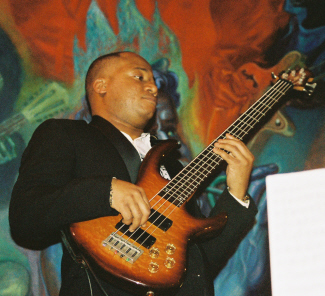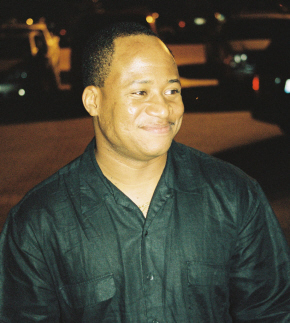Interview & Photos by Brad Walseth
Standing outside the Jazz City Latin Jazz Fest with Evolution Trio bassist Victor Miranda. Victor was one of the top musicians in his native Cuba, playing with top names like Grupo Yarey, Grupo Ireme, Grupo Cumbre, Aramis Galindo Y Su Grupo, Maraca & Afro-Cuban Jazz Masters, featuring Giovanni Hidalgo, Tata Güines “Changuito” and Jimmy Bosch, Grupo Maraca Y Otra Vision, and Orquestra Aragon with flautist David Valenti. Victor appears on several albums, including multi-instrumentalist composer Orlando “Maraca” Valle's Grammy-nominated (2002 Best Salsa Album) “Tremenda Rumba.” Since leaving Cuba, Victor joined fusion guitarist Al Dimeola, with whom he toured and recorded “Consequence of Chaos.” Now active on the Chicago scene with groups like Darwin Noguera's Evolution Trio and the Chicago Afro-Latin Jazz Ensemble, Victor kindly took time to talk to JazzChicago.net. (Ed.note: The exuberant performance by Conjuncto in the background led to some difficulty in transcribing.)
Jazzchicago: So you came to America 2 or 3 years ago?
Victor Miranda: Three years ago.
Jazzchicago: And you didn't expect to come — this a last minute decision?
Victor Miranda: I was happy to come. Always I had liked to live in the U.S.A. because it’s very important for the musician, for many people. It was a decision in the last minute, but I was thinking before about it.
 Jazzchicago: So when it came time to go back, you just didn’t meet the rest of the band at the plane?
Jazzchicago: So when it came time to go back, you just didn’t meet the rest of the band at the plane?
Victor Miranda: No.
Jazzchicago: You defected?
Victor Miranda: Yes.
Jazzchicago: Well had been playing for years with some of the top musicians in Cuba, correct?
Victor Miranda: Yes, I was playing with “Maraca” (Orlando Valle) — he is a very famous Latin jazz player.
Jazzchicago: When did you start playing – as a small child?
Victor Miranda: What I started playing was the violin in school. I was 8 years old. I studied violin for 7 years and then I started on the guitar. I was a student of the classical guitar.
Jazzchicago: There’s a bit of that style in your bass playing.
Victor Miranda: Yes.
Jazzchicago: So how did you switch to the bass?
Victor Miranda: Because when I was around 14 years old, I was very, very, very attracted to the bass. I started guitar because it’s very close to the bass. So I was very happy with playing bass.
Jazzchicago: Who were your influences as far as bass players?
Victor Miranda: In Cuba there are many bass players that I love, but here my is Jaco Pastroius of course, Victor Wooten, John Patitucci.
Jazzchicago: So how did you hook up with Al Dimeola?
Victor Miranda: Yeah I was playing with him for two years. I met him because I was playing in Europe with my group from Cuba and I was in the same concert. After the concert he came to me and he said “Hey man, I would like to play with you someday.” And I said “OK, me too.” And so he knew I was in the United States and he called me and I started playing with him.
Jazzchicago: You were with him for 2 years?
 Victor Miranda: Yes for two years. We played together on many tunes and the last recording featuring Chick Corea and John Patitucci.
Victor Miranda: Yes for two years. We played together on many tunes and the last recording featuring Chick Corea and John Patitucci.
Jazzchicago: How did you end up in Chicago?
Victor Miranda: I played with Darwin Noguera in the Chicago Afro-Latin Jazz Ensemble. Many musicians called me and hey I’m here!
Jazzchicago: You plan on staying?
Victor Miranda: Yeah, yeah. You know the musicians are it. You have to work around...I love New York, but ...
You know when I was a student, I studied my instrument every day for 8 hours. Right now I study around 2 hours each day maybe 3 – it’s a lot of dedication.
Jazzchicago: What do you like about playing with Darwin and the Evolution Trio?
Victor Miranda: Oh Darwin I love. Here in Chicago I was playing with another band and Darwin was the piano player. When he said to me "hey man I would like to play with you," I was there, because he is a good piano player. We’re friends, and there is a good relationship between the bass and keyboards — it's excellent.
Jazzchicago: What about Charles “Rick” Heath?
Victor Miranda: Oh, he’s the best! Good player, good enthusiasm. And he… the trio is growing up every day, because he’s a very good drum player, very strong, very exacting.
Jazzchicago: He has an interesting style. I saw Eric Gravatt with McCoy Tyner recently and Charles reminds me a bit of how Gravatt plays.
Victor Miranda: Yes those drummers have a different style. There is another good drum player – Marcus Baylor — from the Yellowjackets – he has a style very similar to Charles.
Jazzchicago: You are also playing with the Chicago Afro Latin Jazz Ensemble?
Victor Miranda: I have been playing with them here in Chicago from the beginning – so it’s a good orchestra, excellent compositions, excellent musicians, so I’m very happy to make that.
Jazzchicago: What was it like being a musician and growing up in Cuba?
Victor Miranda: Well, I was very happy to study in Cuba, because the Cuban musicians, we play all of it – all the styles. And remember when I was in school my teacher, he bring me samba, he bring me (unintelligible) he bring me another (unintelligible ), he bring me all of it – so I was trying to play different styles, you know. And too late I can't say thinks – very important?
 Jazzchicago: Was the life in Cuba hard?
Jazzchicago: Was the life in Cuba hard?
Victor Miranda: Yeah. Right now the economics aren’t good- very hard and
difficult. Many musicians have to go to other countries.
Jazzchicago: Do you still have family in Cuba?
Victor Miranda: Yes, my Mom. My grandfather.
Jazzchicago: But you are able to communicate with them?
Victor Miranda: Yes, yes.
Jazzchicago: But you can’t go back and visit?
Victor Miranda: Yeah, you can.
Jazzchicago: You are legal now?
Victor Miranda: Yes.
Jazzchicago: So it worked out good – a little risky at the beginning?
Victor Miranda: Yes, a little tight at first, but now — excellent.
Jazzchicago: Well, we’re happy to have you here.
Victor Miranda: Yeah me too. Thank you very much.
|

